初中英语单项选择题答题技巧和练习
- 格式:doc
- 大小:34.00 KB
- 文档页数:6

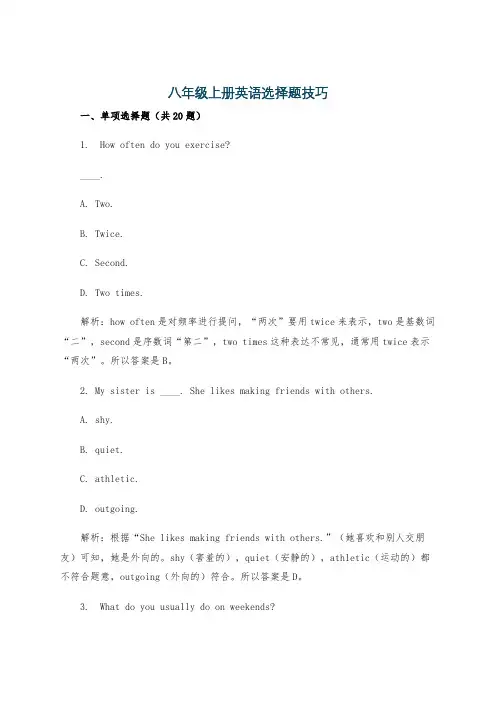
八年级上册英语选择题技巧一、单项选择题(共20题)1. How often do you exercise?____.A. Two.B. Twice.C. Second.D. Two times.解析:how often是对频率进行提问,“两次”要用twice来表示,two是基数词“二”,second是序数词“第二”,two times这种表达不常见,通常用twice表示“两次”。
所以答案是B。
2. My sister is ____. She likes making friends with others.A. shy.B. quiet.C. athletic.D. outgoing.解析:根据“She likes making friends with others.”(她喜欢和别人交朋友)可知,她是外向的。
shy(害羞的),quiet(安静的),athletic(运动的)都不符合题意,outgoing(外向的)符合。
所以答案是D。
3. What do you usually do on weekends?I often ____ my grandparents.A. visit.B. visited.C. have visited.D. will visit.解析:根据问句中的“usually”可知是一般现在时,主语I是第一人称,动词用原形,visited是一般过去式,have visited是现在完成式,will visit是一般将来式,visit是原形。
所以答案是A。
4. There ____ some milk and apples in the fridge.A. is.B. are.C. have.D. has.解析:there be句型遵循就近原则,靠近be动词的名词是some milk,milk是不可数名词,所以be动词用is。
have和has表示“有”,是某人拥有某物,不用于there be句型。
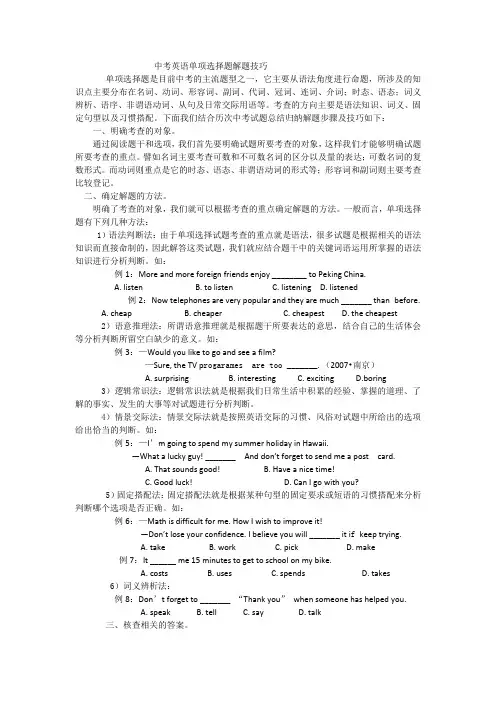
中考英语单项选择题解题技巧单项选择题是目前中考的主流题型之一,它主要从语法角度进行命题,所涉及的知识点主要分布在名词、动词、形容词、副词、代词、冠词、连词、介词;时态、语态;词义辨析、语序、非谓语动词、从句及日常交际用语等。
考查的方向主要是语法知识、词义、固定句型以及习惯搭配。
下面我们结合历次中考试题总结归纳解题步骤及技巧如下:一、明确考查的对象。
通过阅读题干和选项,我们首先要明确试题所要考查的对象,这样我们才能够明确试题所要考查的重点。
譬如名词主要考查可数和不可数名词的区分以及量的表达;可数名词的复数形式。
而动词则重点是它的时态、语态、非谓语动词的形式等;形容词和副词则主要考查比较登记。
二、确定解题的方法。
明确了考查的对象,我们就可以根据考查的重点确定解题的方法。
一般而言,单项选择题有下列几种方法:1)语法判断法:由于单项选择试题考查的重点就是语法,很多试题是根据相关的语法知识而直接命制的,因此解答这类试题,我们就应结合题干中的关键词语运用所掌握的语法知识进行分析判断。
如:例1:More and more foreign friends enjoy ________ to Peking China.A. listenB. to listenC. listeningD. listened例2:Now telephones are very popular and they are much _______ than before.A. cheapB. cheaperC. cheapestD. the cheapest2)语意推理法:所谓语意推理就是根据题干所要表达的意思,结合自己的生活体会等分析判断所留空白缺少的意义。
如:例3:—Would you like to go and see a film?—Sure, the TV p rogarames are too _______.(2007•南京)A. surprisingB. interestingC. excitingD.boring3)逻辑常识法:逻辑常识法就是根据我们日常生活中积累的经验、掌握的道理、了解的事实、发生的大事等对试题进行分析判断。
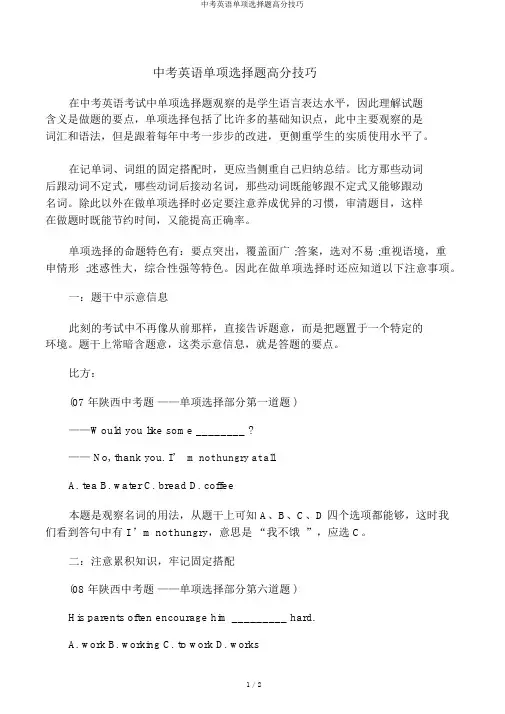
中考英语单项选择题高分技巧在中考英语考试中单项选择题观察的是学生语言表达水平,因此理解试题含义是做题的要点,单项选择包括了比许多的基础知识点,此中主要观察的是词汇和语法,但是跟着每年中考一步步的改进,更侧重学生的实质使用水平了。
在记单词、词组的固定搭配时,更应当侧重自己归纳总结。
比方那些动词后跟动词不定式,哪些动词后接动名词,那些动词既能够跟不定式又能够跟动名词。
除此以外在做单项选择时必定要注意养成优异的习惯,审清题目,这样在做题时既能节约时间,又能提高正确率。
单项选择的命题特色有:要点突出,覆盖面广 ;答案,选对不易 ;重视语境,重申情形;迷惑性大,综合性强等特色。
因此在做单项选择时还应知道以下注意事项。
一:题干中示意信息此刻的考试中不再像从前那样,直接告诉题意,而是把题置于一个特定的环境。
题干上常暗含题意,这类示意信息,就是答题的要点。
比方:(07 年陕西中考题——单项选择部分第一道题 )——Would you like some ________ ?—— No, thank you. I’ m not hungry at all.A. teaB. waterC. breadD. coffee本题是观察名词的用法,从题干上可知 A、B、C、D 四个选项都能够,这时我们看到答句中有 I ’m not hungry,意思是“我不饿”,应选 C。
二:注意累积知识,牢记固定搭配(08 年陕西中考题——单项选择部分第六道题 )His parents often encourage him _________ hard.A. workB. workingC. to workD. works1 / 2本是考的用法,从干可知考 encourage 的用法,后边跟不定式,故 C。
因此必定要多去累相关的,想。
三:注意,消除干(08 年西中考——部分第四道 )After discussing, the students _________ some good ideas to work on the project.A. put upB. set upC. caught up withD. came up with本是考的用法,从干可知:put up 意建筑 ;set up 意建立; catch up with 意追上⋯;填到句子中都不通,而come up with 意想出,供给。
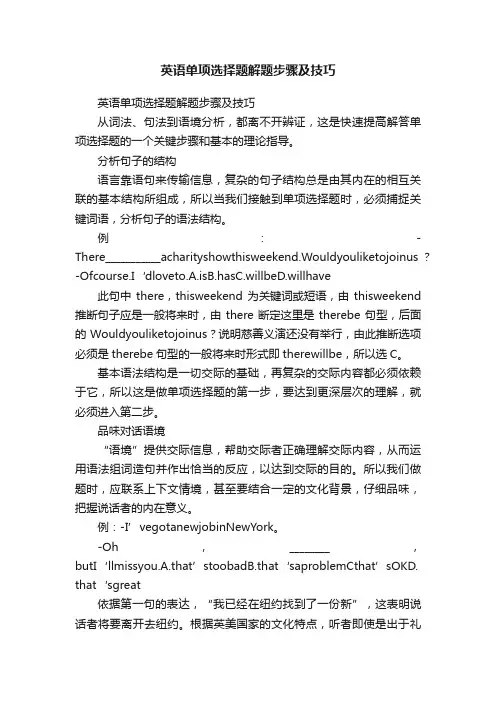
英语单项选择题解题步骤及技巧英语单项选择题解题步骤及技巧从词法、句法到语境分析,都离不开辨证,这是快速提高解答单项选择题的一个关键步骤和基本的理论指导。
分析句子的结构语言靠语句来传输信息,复杂的句子结构总是由其内在的相互关联的基本结构所组成,所以当我们接触到单项选择题时,必须捕捉关键词语,分析句子的语法结构。
例:-There___________acharityshowthisweekend.Wouldyouliketojoinus?-Ofcourse.I‘dloveto.A.isB.hasC.willbeD.willhave此句中there,thisweekend为关键词或短语,由thisweekend 推断句子应是一般将来时,由there断定这里是therebe句型,后面的Wouldyouliketojoinus?说明慈善义演还没有举行,由此推断选项必须是therebe句型的一般将来时形式即therewillbe,所以选C。
基本语法结构是一切交际的基础,再复杂的交际内容都必须依赖于它,所以这是做单项选择题的第一步,要达到更深层次的理解,就必须进入第二步。
品味对话语境“语境”提供交际信息,帮助交际者正确理解交际内容,从而运用语法组词造句并作出恰当的反应,以达到交际的目的。
所以我们做题时,应联系上下文情境,甚至要结合一定的文化背景,仔细品味,把握说话者的内在意义。
例:-I’vegotanewjobinNewYork。
-Oh,________,butI‘llmissyou.A.that’stoobadB.that‘saproblemCthat’sOKD. that‘sgreat依据第一句的表达,“我已经在纽约找到了一份新”,这表明说话者将要离开去纽约。
根据英美国家的文化特点,听者即使是出于礼貌也应该给对方美好的祝愿,所以选D项,也可以说Congratulations!Howluckyyouare!等诸如此类的话。
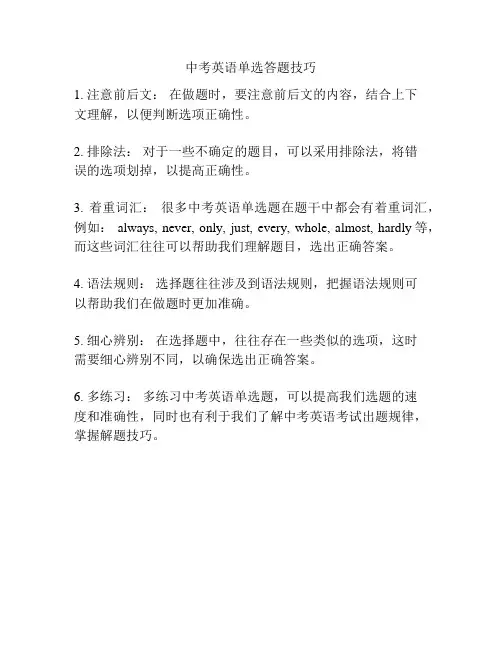
中考英语单选答题技巧
1. 注意前后文:在做题时,要注意前后文的内容,结合上下
文理解,以便判断选项正确性。
2. 排除法:对于一些不确定的题目,可以采用排除法,将错
误的选项划掉,以提高正确性。
3. 着重词汇:很多中考英语单选题在题干中都会有着重词汇,例如: always, never, only, just, every, whole, almost, hardly等,而这些词汇往往可以帮助我们理解题目,选出正确答案。
4. 语法规则:选择题往往涉及到语法规则,把握语法规则可
以帮助我们在做题时更加准确。
5. 细心辨别:在选择题中,往往存在一些类似的选项,这时
需要细心辨别不同,以确保选出正确答案。
6. 多练习:多练习中考英语单选题,可以提高我们选题的速
度和准确性,同时也有利于我们了解中考英语考试出题规律,掌握解题技巧。
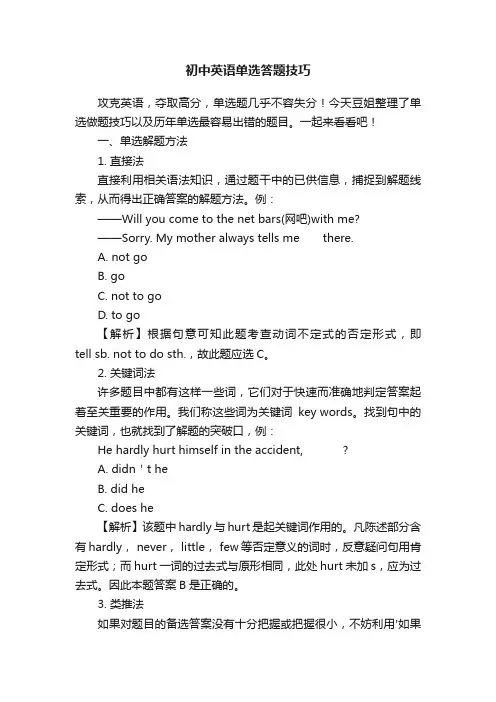
初中英语单选答题技巧攻克英语,夺取高分,单选题几乎不容失分!今天豆姐整理了单选做题技巧以及历年单选最容易出错的题目。
一起来看看吧!一、单选解题方法1. 直接法直接利用相关语法知识,通过题干中的已供信息,捕捉到解题线索,从而得出正确答案的解题方法。
例:——Will you come to the net bars(网吧)with me?——Sorry. My mother always tells me there.A. not goB. goC. not to goD. to go【解析】根据句意可知此题考查动词不定式的否定形式,即tell sb. not to do sth.,故此题应选C。
2. 关键词法许多题目中都有这样一些词,它们对于快速而准确地判定答案起着至关重要的作用。
我们称这些词为关键词key words。
找到句中的关键词,也就找到了解题的突破口,例:He hardly hurt himself in the accident, ?A. didn't heB. did heC. does he【解析】该题中hardly与hurt是起关键词作用的。
凡陈述部分含有hardly, never, little, few等否定意义的词时,反意疑问句用肯定形式;而hurt一词的过去式与原形相同,此处hurt未加s,应为过去式。
因此本题答案B是正确的。
3. 类推法如果对题目的备选答案没有十分把握或把握很小,不妨利用'如果A对,那么B也对'的类推法,从而可将A、B予以否定,例:——Who's the man at the door?—— .A. He is a doctorB. He is a friend of mineC. He is a famous singerD. He is twenty【解析】仔细分析备选答案就可发现:A、C选项针对的是'职业'。
若A是对的,那么C也会是对的。
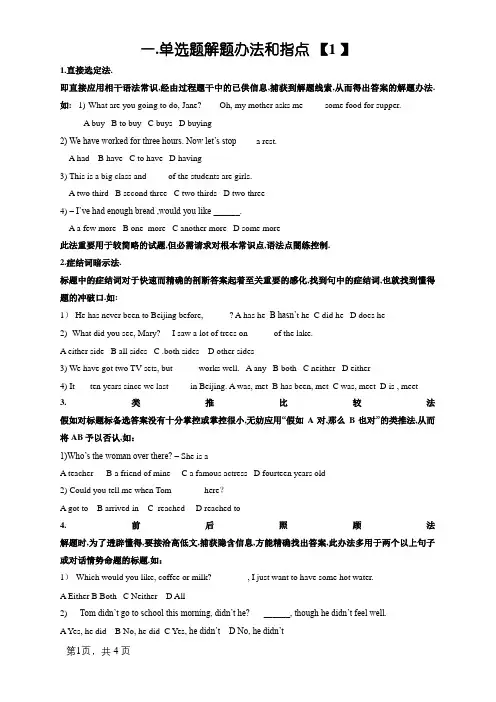
一.单选题解题办法和指点【1 】1.直接选定法.即直接应用相干语法常识,经由过程题干中的已供信息,捕获到解题线索,从而得出答案的解题办法.如: 1)-What are you going to do, Jane? -Oh, my mother asks me ____ some food for supper.A buyB to buyC buysD buying2) We have worked for three hours. Now let’s stop ____a rest.A hadB haveC to haveD having3) This is a big class and ____ of the students are girls.A two thirdB second threeC two thirdsD two three4) –I’ve had enough bread ,would you like ______.A a few moreB one moreC another moreD some more此法重要用于较简略的试题,但必需请求对根本常识点,语法点闇练控制.2.症结词暗示法.标题中的症结词对于快速而精确的剖断答案起着至关重要的感化,找到句中的症结词,也就找到懂得题的冲破口.如:1) He has never been to Beijing before,______? A has he B hasn’t he C did he D does he2) -What did you see, Mary? -I saw a lot of trees on _____ of the lake.A either sideB all sidesC .both sidesD other sides3) We have got two TV sets, but _____ works well. A any B both C neither D either4) It___ ten years since we last ____ in Beijing. A was, met B has been, met C was, meet D is , meet 3.类推比较法假如对标题标备选答案没有十分掌控或掌控很小,无妨应用“假如A对,那么B也对”的类推法,从而将AB予以否认,如:1)Who’s the woman over there? – She is a ____A teacherB a friend of mineC a famous actressD fourteen years old2) Could you tell me when Tom_______ here?A got toB arrived inC reachedD reached to4.前后照顾法解题时,为了透辟懂得,要接洽高低文,捕获隐含信息,方能精确找出答案,此办法多用于两个以上句子或对话情势命题的标题.如:1)-Which would you like, coffee or milk? -____ , I just want to have some hot water.A EitherB BothC NeitherD All2)- Tom didn’t go to school this morning, didn’t he? -______, though he didn’t feel well.A Yes, he didB No, he didC Yes, he didn’tD No, he didn’t5.逐个消除法依据题干供给的信息,将干扰答案和错误答案逐个消除,缩小选题规模,然后将残剩的填入空白处进行检讨,肯定是否精确,如:1)Could you tell me_____ ?A who is that manB how much it costs to fly to BeijingC why is he crying so sadlyD whether has he arrived2) Remember ,boys and girls ___ you work, __ result you will get.A The better, the harderB The harder, the betterC The hard, the betterD The harder, the good3) I usually have milk and bread for supper.-______.A So have IB So do IC I have toD I do so4) I asked you ______ next.A what shall we doB we should do whatC what should we doD what we should do5) Could you tell me ___? I have something important to tell him.A where is TomB where Tom isC where Tom isD where Tom was6.外交应答依据外交用语的习惯搭配,接洽高低文直接解题,如:1)-Your dress looks really nice. -_____A Not at allB ThanksC Not nicer than yoursD Don’t say so2) –Could you help me carry the heavy box. -_______.A My pleasureB You are rightC Don’t worryD with pleasure3) - I lost my bike yesterday. -______A Who did itB I’m sorry to hear thatC Never mindD Don’t worry, you can buy another one.4)-Don’t step on the grass. -______.A Is that so?B Don’t worryC I don’t knowD Sorry ,I won’t5) -Would you mind if I sit here? - ______, it’s for Mr. Brown.A Not at allB Never mindC Better notD Of course not在做此种类型的请求我们必须懂得中西方文化差别,防止受中国传统习俗的影响,还用卖力审题弄清对话所给的情景.二.罕有陷阱即解题技能单项选择题考核学生精确而灵巧的应用语法常识的才能和在语境中进行外交的才能,是以,答题时同窗们不活该板硬套,而是应当因时制宜,灵巧作答.以下是罕有的陷阱类型.陷阱一:应用固定词语或固定搭配干扰选项.如1)There is a lot ___ vegetables in the supermarket this week than last week.A ofB manyC muchD more2) -Would you like some tea? – Yes, I prefer tea____ sugar.A toB forC withD of陷阱二:省略句子成分,干扰选项.如:1)-What do you think made the little girl so happy? -______ a new dress.A Because she boughtB BuyingC Because of buyingD As she bought2) - What are on show in the museum?–Some pictures_____ by Tom last weekA tookB were takenC takenD are taken陷阱三:套用某种句型,干扰固定搭配.如:When he went to see the doctor , he was told not only ____to bed early, but also ___ do more exercises.A go, doB going, doingC to go, to doD went, did陷阱四:应用汉语思维,干扰选项.如:1)The price of gold is ____ than before. A expensive B more expensive C high D higher.2) China has _____ population in the world. A the most B the least C the largest D the smallest陷阱五:导致时态误用,干扰选项.如:1)I don’t know if he _____here , I will tell you if he _____.A comes, comesB will come, comesC comes, will comeD will come, will come2) We will have a meeting as soon as he ____. A reaches B will arrive C arrives D will reach3) You can’t pass the test next term unless you ____ hard .A will studyB studyC has studiedD are studying4)-Mum, when all we go out? - As long as your homework____A will finishB has finishedC is finishedD will be finished.陷阱六:混用类似句型句式,干扰选项.如:1) Shanghai is larger than____ city in India. A any other B the other C any D the2) She used ____up late, but now he is used ____up earlyA to get, to getB to get, to gettingC to getting, to gettingD to getting, to get陷阱七:常识记忆缺点,干扰选项.如:1)There is ___“u” and ____“ s” in the word “bus”. A a, an B an, an C an, a D a, a2) I like the silk dress ,and it ______ soft and comfortable.A feelsB is feltC is feelingD has felt3) This is __ song I told you to listen to. Isn’t it __ beautiful one? A the, the B the, a C a, the D a, a4) He told us that the sun _____ in the east. A rose B had risen C rises D roses5) Which is ____of the two girls?A beautifulB more beautifulC the most beautifulD the more beautiful陷阱八:拔出定语从句或宾语从句.干扰选项1) Everything I ___ to the new house. A have taken B has been taken C have has been taken D was taken2) You can never imagine what great difficulty I have _ your house.A foundB to findC findingD founded3) The man we talked to _____ us happy sometimes. A make B makes C made D making4) The man whose song we are fond of ____ in our city next week.A singingB to singC singsD will sing5) The doctor did what he could ______ the sick man.A to saveB savedC saveD saving。
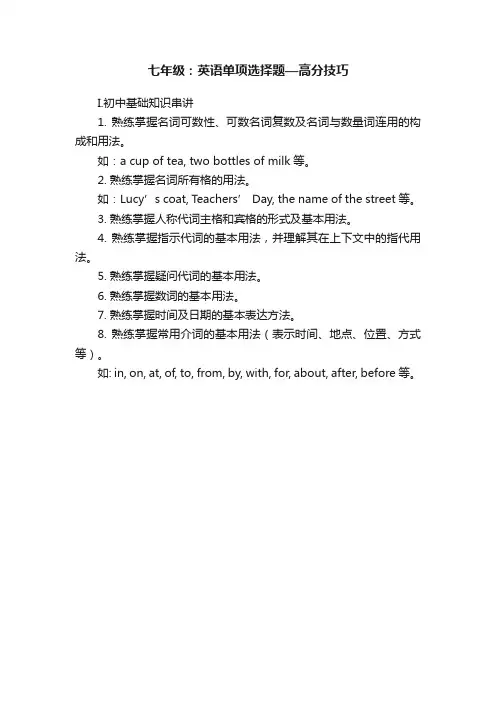
七年级:英语单项选择题—高分技巧I.初中基础知识串讲1. 熟练掌握名词可数性、可数名词复数及名词与数量词连用的构成和用法。
如:a cup of tea, two bottles of milk等。
2. 熟练掌握名词所有格的用法。
如:Lucy’s coat, T eachers’ Day, the name of the street等。
3. 熟练掌握人称代词主格和宾格的形式及基本用法。
4. 熟练掌握指示代词的基本用法,并理解其在上下文中的指代用法。
5. 熟练掌握疑问代词的基本用法。
6. 熟练掌握数词的基本用法。
7. 熟练掌握时间及日期的基本表达方法。
8. 熟练掌握常用介词的基本用法(表示时间、地点、位置、方式等)。
如: in, on, at, of, to, from, by, with, for, about, after, before等。
9. 熟练掌握形容词作定语、表语及宾语补足语的用法。
10. 熟练掌握表示时间、地点、方式、程度、原因等疑问副词的用法。
11. 熟练掌握形容词、副词比较级和最高级的变化形式。
如:good, well, many, much等。
12. 熟练掌握形容词、副词比较等级的基本句型及基本用法。
如:as + 原级+as…not as (so) + 原级+ as…比较级+ than …the + 最高级+ … in (of)…Which (Who) … + 比较级,… or …?Which (Who) … + 最高级,…, … or …?13. 熟练掌握动词五种基本形式:动词原形、一般现在时第三人称单数形式、现在分词、过去式和过去分词。
14. 熟练掌握一般现在时、一般过去时、一般将来时、现在完成时、现在进行时、过去进行时的构成和基本用法。
15. 熟练掌握系动词be的用法。
16. 熟练掌握宾语从句的构成和用法。
II. 单项选择题型特点1. 基础且重要:争取全对2. 灵活且广泛:语法、词汇、常识和惯用法3. 趋势与变化:加强对语境交际能力考查,对英语国家文化考查III. 单项选择答题技巧1). 直接判定法Pass ________ the knife, please. My pencil is broken.A. IB. meC. myD. mine— What time did you get there this morning?— ________ eight.A. InB. OnC. AtD. From参考答案:B C2). 逐个筛选法Is there ______ in today’s newspaper?A. anything specialB. something specialC. nothing specialD. special anything参考答案:A3) 分析比较法— Do you know ________?— Next year.A. when he came hereB. when did he come hereC. when he will come hereD. when will he come here参考答案:C4). 联系语境法Don’t ________ the radio. The baby is sleeping.A. turn offB. turn onC. turn overD. turn down 参考答案:B5). 词义词组辨析法I like writing to my friends. It ____ a lot of time.A. usesB. takesC. spendsD. hasWill you ____ your address here?A. put downB. put offC. put outD. put away 参考答案:B A6). 常识运用法People usually eat mooncakes on ______.A. Teachers’ DayB. their birthdaysC. May DayD. Mid-Autumn Day参考答案:D7). 注重语境、文化背景① —It’s getting late. I’m afraid I must be going now.— OK. ___________.A. Take it easyB. Go slowlyC. Stay longerD. See you② —Jim, I’m afraid I can’t go to your party tonight. My grandma is ill.— _______!A. That’s all rightB. Don’t worryC. She has to stay in bedD. I’m sorry to hear that③ — Would you mind if I use your bike?— ____.A. Yes, do pleaseB. Of courseC. Of course notD. All right④ —I’m sorry to break your glass.— ____.A. Don’t say thatB. Never mindC. You’re welcomeD. That’s right⑤ — Would you like to see the film with me tonight?— ___________.A. Not at all.B. No, I don’t.C. Yes, I’d love to.D. That’s right.⑥ — Could I ask you a rather personal question?— Of course. _______.A. Good idea.B. That’s right.C. Never mind.D. Go ahead.参考答案:①D ②D ③C ④B ⑤C ⑥DIV. 常见错误分析1). 熟记固定搭配① It was raining ____ last night.A. stronglyB. heavilyC. hardlyD. largely② I finally finished ____ the novel before the start of the new term.A. readingB. to readC. readD. reads2) 克服思维定式① We keep in touch ____ writing often.A. withB. ofC. onD. by② We’ve talked a lot ____ cars. What about trains?A. ofB. withC. aboutD. in3). 知其一,更应知其二① I hope my son ____ give you any trouble.A. won’tB. not toC. don’tD. not② —Let’s go fishing if it ____ this weekend.— But nobody knows if it ____.A. is fine, will rainB. will be fine, rainsC. is fine, rainsD. will be fine, will rainV. 日常训练要求1) 让自己的改错本成为最好的参考书原题+正确答案+错选答案+解析2). 一题多变,告别“题海战术”— What a heavy rain!— So it is. I prefer ____ at home ____ on such a rainy day.A. watch TV; to go outB. watch TV; go outC. watching TV; to going outD. to watch TV; going out参考答案:C“变选项”:如果把D改为:to watch TV; rather than go out.即: I prefer to watch TV at home rather than go out on such a rainy day.prefer to do sth. rather than do sth.“变题干”:如果把题干变为I would rather ______ at home than _____ on sucha rainy day.would rather do sth. than do sth.prefer doing to doingprefer to do rather than dowould rather do than do3). 计时完成15道题在10-12分钟内完成。
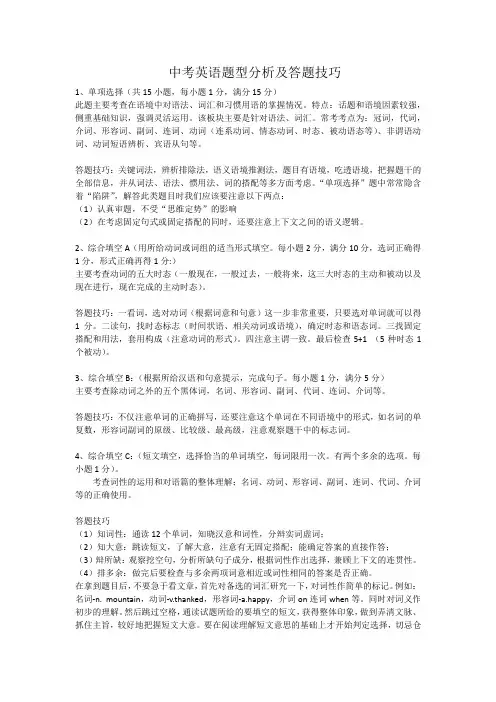
中考英语题型分析及答题技巧1、单项选择(共15小题,每小题1分,满分15分)此题主要考查在语境中对语法、词汇和习惯用语的掌握情况。
特点:话题和语境因素较强,侧重基础知识,强调灵活运用。
该板块主要是针对语法、词汇。
常考考点为:冠词,代词,介词、形容词、副词、连词、动词(连系动词、情态动词、时态、被动语态等)、非谓语动词、动词短语辨析、宾语从句等。
答题技巧:关键词法,辨析排除法,语义语境推测法,题目有语境,吃透语境,把握题干的全部信息,并从词法、语法、惯用法、词的搭配等多方面考虑。
“单项选择”题中常常隐含着“陷阱”,解答此类题目时我们应该要注意以下两点:(1)认真审题,不受“思维定势”的影响(2)在考虑固定句式或固定搭配的同时,还要注意上下文之间的语义逻辑。
2、综合填空A(用所给动词或词组的适当形式填空。
每小题2分,满分10分,选词正确得1分,形式正确再得1分:)主要考查动词的五大时态(一般现在,一般过去,一般将来,这三大时态的主动和被动以及现在进行,现在完成的主动时态)。
答题技巧:一看词,选对动词(根据词意和句意)这一步非常重要,只要选对单词就可以得1分。
二读句,找时态标志(时间状语、相关动词或语境),确定时态和语态词。
三找固定搭配和用法,套用构成(注意动词的形式)。
四注意主谓一致。
最后检查5+1 (5种时态1个被动)。
3、综合填空B:(根据所给汉语和句意提示,完成句子。
每小题1分,满分5分)主要考查除动词之外的五个黑体词,名词、形容词、副词、代词、连词、介词等。
答题技巧:不仅注意单词的正确拼写,还要注意这个单词在不同语境中的形式,如名词的单复数,形容词副词的原级、比较级、最高级,注意观察题干中的标志词。
4、综合填空C:(短文填空,选择恰当的单词填空,每词限用一次。
有两个多余的选项。
每小题1分)。
考查词性的运用和对语篇的整体理解;名词、动词、形容词、副词、连词、代词、介词等的正确使用。
答题技巧(1)知词性:通读12个单词,知晓汉意和词性,分辩实词虚词;(2)知大意:跳读短文,了解大意,注意有无固定搭配;能确定答案的直接作答;(3)辩所缺:观察挖空句,分析所缺句子成分,根据词性作出选择,兼顾上下文的连贯性。
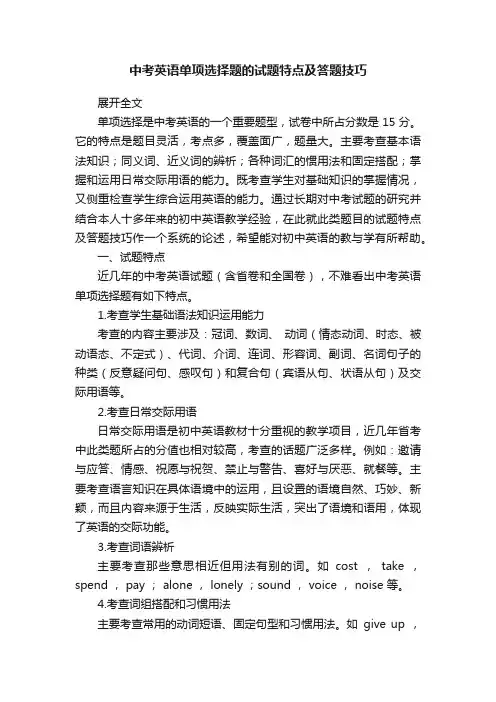
中考英语单项选择题的试题特点及答题技巧展开全文单项选择是中考英语的一个重要题型,试卷中所占分数是15分。
它的特点是题目灵活,考点多,覆盖面广,题量大。
主要考查基本语法知识;同义词、近义词的辨析;各种词汇的惯用法和固定搭配;掌握和运用日常交际用语的能力。
既考查学生对基础知识的掌握情况,又侧重检查学生综合运用英语的能力。
通过长期对中考试题的研究并结合本人十多年来的初中英语教学经验,在此就此类题目的试题特点及答题技巧作一个系统的论述,希望能对初中英语的教与学有所帮助。
一、试题特点近几年的中考英语试题(含省卷和全国卷),不难看出中考英语单项选择题有如下特点。
1.考查学生基础语法知识运用能力考查的内容主要涉及:冠词、数词、动词(情态动词、时态、被动语态、不定式)、代词、介词、连词、形容词、副词、名词句子的种类(反意疑问句、感叹句)和复合句(宾语从句、状语从句)及交际用语等。
2.考查日常交际用语日常交际用语是初中英语教材十分重视的教学项目,近几年省考中此类题所占的分值也相对较高,考查的话题广泛多样。
例如:邀请与应答、情感、祝愿与祝贺、禁止与警告、喜好与厌恶、就餐等。
主要考查语言知识在具体语境中的运用,且设置的语境自然、巧妙、新颖,而且内容来源于生活,反映实际生活,突出了语境和语用,体现了英语的交际功能。
3.考查词语辨析主要考查那些意思相近但用法有别的词。
如cost ,take ,spend , pay ; alone , lonely ;sound , voice , noise 等。
4.考查词组搭配和习惯用法主要考查常用的动词短语、固定句型和习惯用法。
如give up ,give in , give out , give away ; It takes sb. Sometime to do sth. 等。
因此,在平时的复习中要注重基础知识的归纳总结,把握重点、要点、攻克难点,多做练习,不断提高应试水平,方能在中考中立于不败之地。
中考英语语法选择题的技巧和23个例题考点英语这个学科虽然需要背的东西比较多,但是他也讲究做题(方法);,好的做题方法不仅能让你节省许多时间,还能令孩子做题正确率翻倍!下面是我给大家带来的中考英语语法选择题的技巧和23个例题考点,盼望能够关心到大家!中考英语语法选择题的技巧和23个例题考点一、单项选择解题技巧单项选择题是这些年来中考英语试卷始终采纳的一种题型。
在英语中考过程中,单项选择的题型虽然比较简洁,但是同时,这种题型包含了词汇、固定搭配、词形变化和语法等多方面学问。
一道单项选择题,不再是单独地测试某一学问点,而是将几个学问点综合起来进行力量考查。
学校英语单项选择题的考点主要分布在:名词、动词、形容词、副词、代词、冠词、连词、介词、情态动词;时态、语态;词义辨析、语序、各种不同的从句及交际用语上。
同学假如想在单项选择方面少丢分,甚至不丢分,在把握基础学问的前提下,还需要把握一些必要的解题技巧。
先做好以下几个方面:1.牢记考试需要把握的单词和固定(短语),同时要熟识单词的词性和词形变化。
2.把握名词可数与不行数,可数名词的单复数形式。
3.依据上下文正确使用连词。
4.娴熟把握英语中的就近原则和主谓全都原则。
5.把握介词的使用方法。
6.熟识日常交际英语。
7.熟识人称代词的各种形式以及它们所做的(句子)成分。
8.精确使用定冠词和不定冠词。
9.认真区分(同义词)和同形词。
10.把握肯定数量的固定句式。
11.牢记动词和介词、副词的固定搭配。
12.熟识上下语境。
1、直接法直接利用相关语法学问,通过题干中的已供信息,捕获到解题线索,从而得出正确答案的解题方法。
例:--Will you come to the net bars(网吧)with me﹖--Sorry.My mother always tells me______ there.A. not goB. goC. not to goD. to go依据句意可知此题考查动词不定式的否定形式,即tell sb. not to do sth.,故此题应选C。
英语选择题解题技巧方法归纳英语单项选择题的解题技巧1、结合语境结合近几年全国各省市中考英语试题来看,单选题的命题方向越来越注重语境的考查。
这类题的特点是,所给的四个选项填入空里,都没有语法错误,所以,同学们只有通过具体的语境分析,才能选择正确答案。
2、情景交际英语是一门语言学习的学科,学习的目的在于英语。
由此,情景交际也就很自然的成为单项选择题的热点。
现在的中考单选题“语境与情景”是命题者命题的主要指导思想。
所以,同学们在解答这类题的时候一定要在具体的情景下使用正确合适的应答。
3、习惯搭配单选题经常会考查一些固定短语、固定结构和习惯用法等。
对于这类题,就需要同学们在平时的学习中注意积累这方面的知识点,遇到这类题,在理解句子意思的基础上,根据习惯搭配就可以直接选择答案。
习惯搭配是解答单选题的捷径。
4、找关键词有的单选题,在题干中会有一些有利于我们解题的关键词,抓住这些关键词会使我们的问题迎刃而解。
这些关键词是我们解题的突破口。
5、分析近义词在英语的选择题中,会有很多近义词辨析这样的题。
这对于同学们来说是很容易丢分的题。
做这类题,需要大家学会区别它们的用法,学会分析。
6、生活常识有的时候在单选题中会出现一些关于政治、历史、地理、风俗习惯、科技等一些常识的考题。
在解这类题的时候,我们就需要借助生活经验以及相关的学科知识来进行推理。
英语选择题解题技巧方法1.形似意近者先。
实践告诉我们,选择题所给选项形状相似性越大,或意义越相近,难度就会越大。
若四个选项形意各不相近,则属记忆性的考查,只要记住一定的知识就能迎刃而解。
形似意近者因其考查内容具有复杂性、广阔性和灵活性,要作出正确的选择就必须具有相当坚实的基础知识才行。
相似性越大,干扰性越大,但答案隐含在其中的可能性也就随之增大。
所以,解题时可以将目标首先就定在形似意近的选项上。
选择题选项设计一般为两项相似,三项相似的不多,四项相似的则更少,相比较而言,还不是太难的。
中考英语单项选择题解题技巧讲解及练习一、考纲考点单项选择题的特点是考点多,覆盖面广,题量大。
中考英语单项选择题的考点主要分布在:名词、动词、形容词、副词、代词、冠词、连词、介词、情态动词、时态、语态、词义辨析、语序、各种不同的从句以及交际用语上。
从近几年来看,单项选择题始终瞄准“基础知识和基本技能”进行考查,很少有偏题、难题和怪题。
只要复习时把基本知识点和基本用法记住,应对这一类题目的难度应该不大。
此类题目在考查纯语法、词汇的基础上,更增加了在特定的语境中运用词法、句法、惯用法的考查,突出了对学生英语语言综合运用能力的考查和日常交际用语的考查,即词法、句法、惯用法、语境四大考点。
要做好单项选择题,除了必须熟练掌握句型、固定搭配、习惯用法、语法等方面的基础知识,还要掌握一定的解题技巧。
二、语法与词汇单选题相关知识点梳理疑问句r三、单选题解题技巧1.方法与技巧1)直接法通过题干提供的现有信息,可以直接利用熟知的相关语法知识,直接捕捉到解题线索,从而得出正确答案的解题方法。
【典型例题】Everyone knows that Sandy can draw ____________ than any other student in our school.A. goodB.wellC.betterD. best【正确答案】c【测量目标】考查在具体语境中识别并正确理解语法结构【考查内容】副词比较级【难度等级】基础【思路解析】根据句意可知此题考查副词的比较级结构表最高级意思,即better than any other student,故此题应选C。
2)关键词法所谓关键词(key word),就是指在题目中可以对判定答案起至关重要作用的词。
只要找到题目中的关键词,也就找到了解题的突破口。
【典型例题】There are few new types of MP4 for us to choose in this department store, ______________ ?A. are theyB.aren't theyC.are thereD. aren't there【正确答案】C【测量目标】考查在具体语境中识别并正确理解语法结构【考查内容】反意疑问句【难度等级】较难【思路解析】本题中few与there are结构是起关键词作用的。
英语单项选择的技巧和方法英语单项选择题是英语考试中常见的题型,也是考察学生对词汇、语法和阅读理解等综合能力的一种重要方式。
下面将介绍一些技巧和方法,帮助你在做英语单项选择题时取得好成绩。
首先,理解题目要求是解答单项选择题的第一步。
阅读题目时要仔细理解题目中的关键词汇,例如连词(and、but、or等)、关系词(who、which、that等)以及词义判断词(like、dislike、prefer 等)。
这些关键词汇有助于我们理解题目的意思,并且可以帮助我们排除一些明显错误的选项。
其次,将选项与题目进行对比是解题的关键。
在阅读选项时,要注意选项中的关键词汇和与题目要求的对应关系。
有时候,选项中会有错误的或干扰性的词汇,我们要学会筛选出这些错误的选项。
此外,我们还可以通过排除法来推测正确的选项,将一些显而易见的错误选项排除掉,然后在余下的选项中进行选择。
再次,切忌主观臆断。
有时候,在解答单项选择题时,我们会受到个人主观认知的影响,但是我们要明确的是,这些题目的答案是根据客观事实的,不是根据个人意愿或习惯去判断的。
因此,我们要尽量客观地看待题目,根据题目要求和给定的信息进行选择。
此外,积累词汇和语法知识也是做好英语单项选择题的基础。
只有积累了足够的词汇和掌握了基本的语法规则,我们才能更好地理解题目和选项,从而更准确地选择答案。
平时多读英文文章,背诵单词和短语,掌握一些常见的语法知识和语法结构,都有助于我们在解答单项选择题时更加得心应手。
最后,要做到练习和反思。
通过做大量的单项选择题练习,我们可以熟悉题型的特点和常见的考点,并且可以不断提高解题的速度和准确度。
在做完题目后,我们要及时检查答案,分析错误的原因,并反思自己的解题思路和方法,以便在下次的练习中避免同样的错误。
通过以上的技巧和方法,相信你能在英语单项选择题中取得好成绩。
记住,理解题目要求,对比选项,客观判断,积累知识,勤练与反思是解答单项选择题的关键。
英语单项选择题的答题技巧第一步:理解语境,推敲语义。
第二步:化繁为简,锁定考点。
第三步:寻找题眼,排除干扰项,确定答案。
除了经常用到的直接法和排除法,以下两种解题方法在答单项选择题时非常有效:还原法:把题干还原为自己熟悉的结构,如将感叹句、倒装句、疑问句的题干改为陈述句,将被动句改为主动句,将强调句式、从句、插入语去掉,或者是将省略句补全插入语去掉,或者是将省略句补全;;类推法:如对题目的备选答案没有把握,利用“如果A 对,那么B 也对”实行判断和推理,排除A 、B 两个选项。
要注意语境,利用信息,适当分析句子结构,特别注意疑问句、感叹句、定语从句中的句子成分还原分还原;;选定答案后尽量不琢磨,不轻易改动所选答案选定答案后尽量不琢磨,不轻易改动所选答案;;注意这部分一定不要花过多的时间,尽量以30秒一题的速度答题。
转换法(二模,二模,25) Look, ____beautiful flowers ____ the girl 25) Look, ____beautiful flowers ____ the girl carrying that she becomes the focus in the room.A.such;isB.so;areC.how;isD.what;are准确答案为A 。
此题是一个such 在句首的结果状语从句的倒装现象,第二空考查了主谓一致。
乍一看,这道题有点无从下手。
我们能够将倒装句转换成正常的语序来降低句子难度,即The girl ____carrying beautiful flowers that she becomes the focus in the room.room.如此一来,不难看出选如此一来,不难看出选A 。
The girl is carrying such beautiful folwers that she becomes the focus in the room.这个女孩捧着如此美丽的花以至于她成为了房间里瞩目的焦点。
一、单选题解题方法和指导1、直接选定法。
即直接利用相关语法知识,通过题干中的已供信息,捕捉到解题线索,从而得出答案的解题方法。
如: 1)-What are you going to do, Jane -Oh, my mother asks me ____ some food for supper.A buyB to buyC buysD buying2) We have worked for three hours. Now let’s stop ____a re st.A hadB haveC to haveD having3) This is a big class and ____ of the students are girls.A two thirdB second threeC two thirdsD two three4) –I’ve had enough bread ,would you like ______.A a few moreB one moreC another moreD some more此法主要用于较简单的试题,但必须要求对基本知识点,语法点熟练掌握。
2、关键词暗示法。
题目中的关键词对于快速而准确的判定答案起着至关重要的作用,找到句中的关键词,也就找到了解题的突破口。
如:1) He has never been to Beijing before,______ A has he B hasn’the C did he D does he2) -What did you see, Mary -I saw a lot of trees on _____ of the lake.A either sideB all sidesC .both sidesD other sides3) We have got two TV sets, but _____ works well. A any B bothC neitherD either4) It___ ten years since we last ____ in Beijing. A was, met B has been, met C was, meet D is , meet3、类推比较法如果对题目的备选答案没有十分把握或把握很小,不妨利用“如果A对,那么B也对”的类推法,从而将AB予以否定,如:1)Who’s the woman over there – She is a ____A teacherB a friend of mineC a famous actress Dfourteen years old2) Could you tell me when Tom_______ hereA got toB arrived inC reachedD reached to4、前后照应法解题时,为了透彻理解,要联系上下文,捕捉隐含信息,方能准确找出答案,此方法多用于两个以上句子或对话形式命题的题目。
如:1)-Which would you like, coffee or milk -____ , I just wantto have some hot water.A EitherB BothC NeitherD All2)- Tom didn’t go to school this morning, didn’t he -______,though he didn’t feel well.A Yes, he didB No, he didC Yes, he didn’tD No, he didn’t5、逐个排除法根据题干提供的信息,将干扰答案和错误答案逐个排除,缩小选题范围,然后将剩余的填入空白处进行检查,确定是否正确,如:1)Could you tell me_____ A who is that man B how much it costs to fly to BeijingC why is he crying so sadlyD whether has he arrived2) Remember ,boys and girls ___ you work, __ result you will get.A The better, the harderB The harder, the betterC The hard,the better D The harder, the good3) I usually have milk and bread for .A So have IB So do IC I have toD I do so4) I asked you ______ next.A what shall we doB we should do whatC what should we do Dwhat we should do5) Could you tell me ___ I have something important to tell him.A where is TomB where Tom isC where Tom isD whereTom was6、交际应答根据交际用语的习惯搭配,联系上下文直接解题,如:1)-Your dress looks really nice. -_____A Not at allB ThanksC Not nicer than yoursD Don’t sayso2) –Could you help me carry the heavy box. -_______.A My pleasureB You are rightC Don’t worryD withpleasure3) - I lost my bike yesterday. -______A Who did itB I’m sorry to hear thatC Never mindD Don’tworry, you can buy another one.4)-Don’t step on the grass. -______.A Is that soB Don’t worryC I don’t knowD Sorry ,Iwon’t5) -Would you mind if I sit here - ______, it’s for Mr. Brown.A Not at allB Never mindC Better notD Of course not在做此种类型的要求我们必须了解中西方文化差异,避免受中国传统习俗的影响,还用认真审题弄清对话所给的情景。
二、常见陷阱即解题技巧单项选择题考查学生准确而灵活的运用语法知识的能力和在语境中进行交际的能力,因此,答题时同学们不应死板硬套,而是应该随机应变,灵活作答。
以下是常见的陷阱类型。
陷阱一:利用固定词语或固定搭配干扰选项。
如1)There is a lot ___ vegetables in the supermarket this week thanlast week.A ofB manyC muchD more2) -Would you like some tea – Yes, I prefer tea____ sugar.A toB forC withD of陷阱二:省略句子成分,干扰选项。
如:1)-What do you think made the little girl so happy -______ a newdress.A Because she boughtB BuyingC Because of buyingD Asshe bought2) - What are on show in the museum–Some pictures_____ by Tom lastweekA tookB were takenC takenD are taken陷阱三:套用某种句型,干扰固定搭配。
如:When he went to see the doctor , he was told not only ____to bed early,but also ___ do more exercises.A go, doB going, doingC to go, to doD went, did陷阱四:利用汉语思维,干扰选项。
如:1)The price of gold is ____ than before. A expensive B more expensive C high D higher.2) China has _____ population in the world. A the most B the leastC the largestD the smallest陷阱五:导致时态误用,干扰选项。
如:1)I don’t know if he _____here , I will tell you if he _____.A comes, comesB will come, comesC comes, will comeD willcome, will come2) We will have a meeting as soon as he ____. A reaches B will arriveC arrivesD will reach3) You can’t pass the test next term unless you ____ hard .A will studyB studyC has studiedD are studying4)-Mum, when all we go out - As long as your homework____A will finishB has finishedC is finishedD will be finished.陷阱六:混用相似句型句式,干扰选项。
如:1) Shanghai is larger than____ city in India. A any other B theother C any D the2) She used ____up late, but now he is used ____up earlyA to get, to getB to get, to gettingC to getting, to gettingD to getting, to get陷阱七:知识记忆缺陷,干扰选项。
如:1)There is ___“u” and ____“ s” in the word “bus”. A a, an Ban, an C an, a D a, a2) I like the silk dress ,and it ______ soft and comfortable.A feelsB is feltC is feelingD has felt3) This is __ song I told you to listen to. Isn’t it __ beautifulone A the, the B the, a C a, the D a, a4) He told us that the sun _____ in the east. A rose B had risenC risesD roses5) Which is ____of the two girlsA beautifulB more beautifulC the most beautifulD themore beautiful陷阱八:插入定语从句或宾语从句。